The Datacomp Women
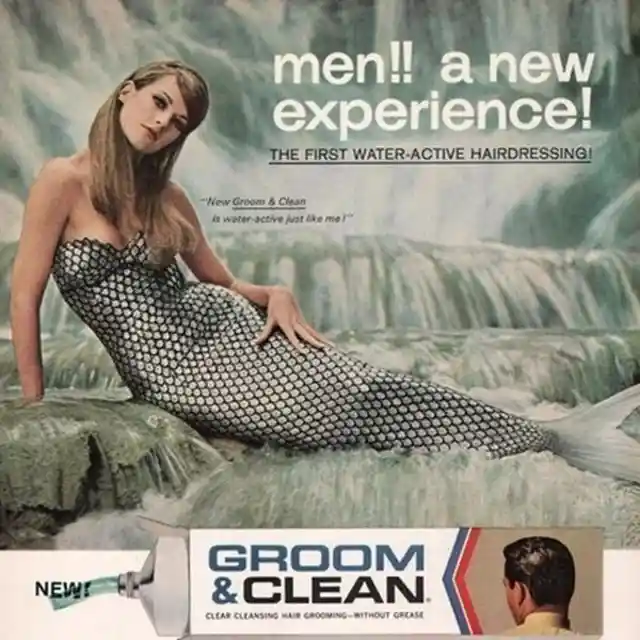
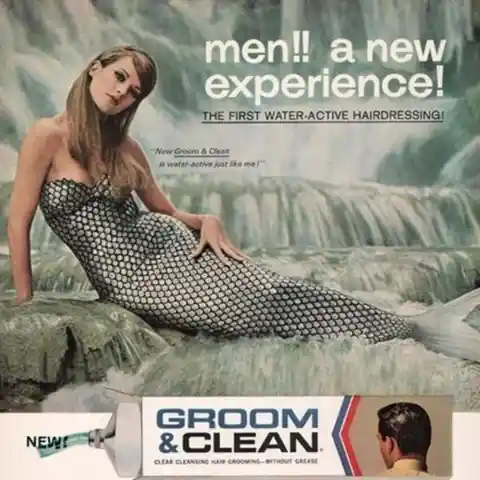
Advertisers are willing to do whatever it takes to sell their products. What was commonplace fifty years ago would certainly never fly today. And what was deemed acceptable then will surely make your jaw drop now.
From promoting husband-pleasing coffee to cocaine toothache drops, there’s no doubt that these old ads would never see the light of day today. You might be appalled to see what kinds of bold and flagrant messages were once used to sell these ordinary, everyday items…
Sweaters For Men
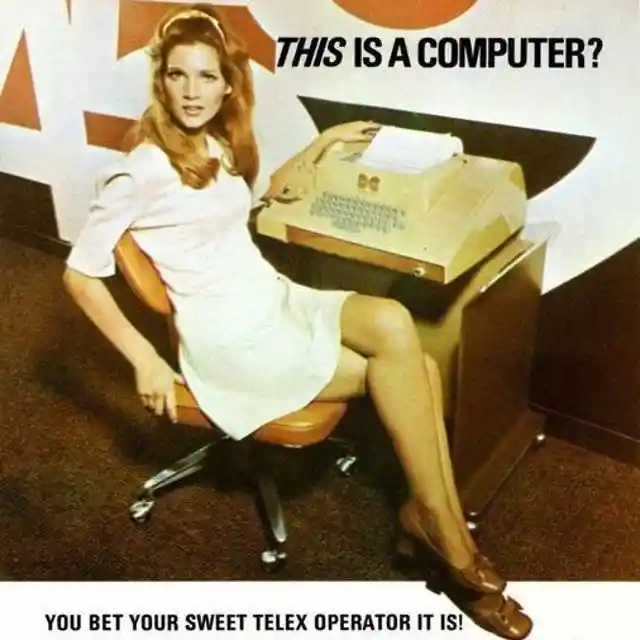
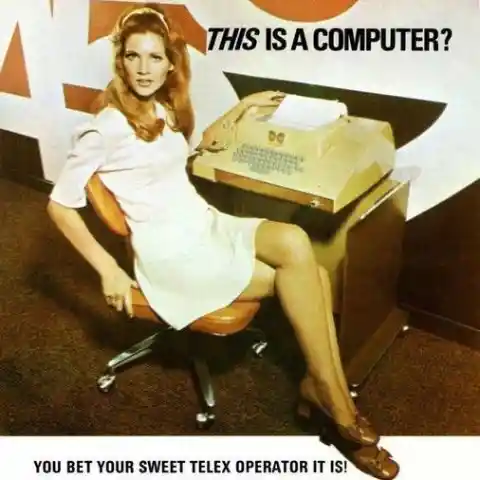
The 1960s were a period of social and political turmoil. Nevertheless, it was also a time of great progress. This was the decade when women began to fight for equality in the workplace and sexuality became more open. In the early 1960s, the civil rights movement gained momentum.
In its ad, Datacomp displayed its office machine next to an attractive secretary in order to catch businessmen’s attention. This was a very common tactic in the ‘60s.
A Good Cigar
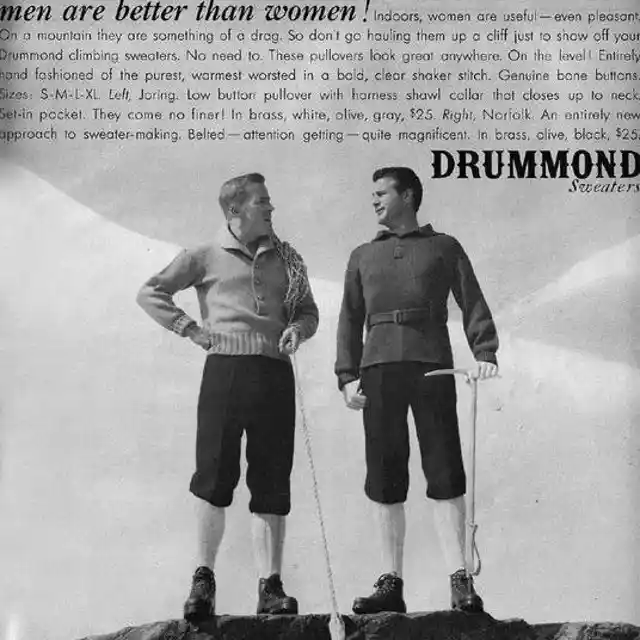
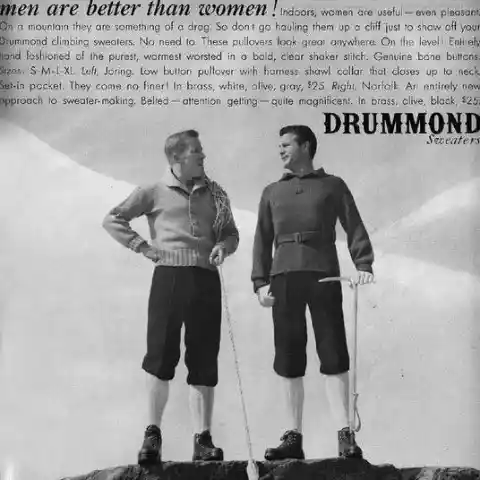
The message behind these climbing sweaters is that only men need to buy this product because women are more useful indoors and “on a mountain would be something of a drag.”
In the accompanying image, two men talk to each other while disregarding a woman struggling. Rock climber Ashima Shiraishi once said, “Here’s hoping that the individuals who made this ad are still alive so they can see that one of the best rock climbers in existence is not a man.”
Sugar And Artificial Sweeteners
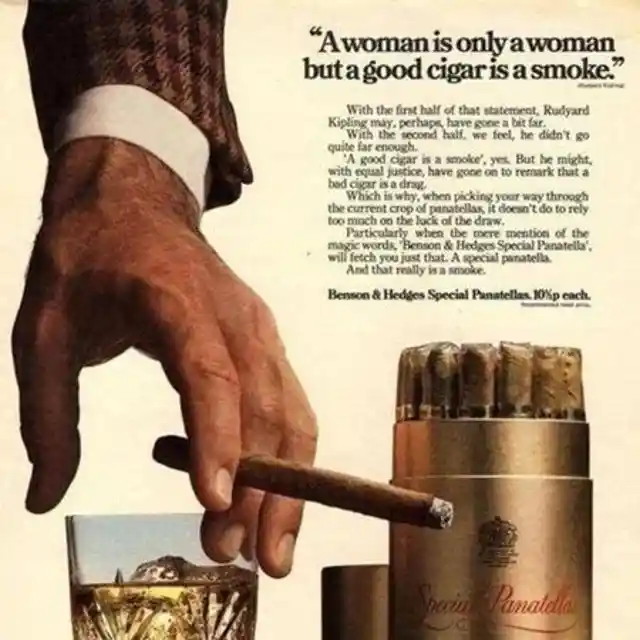
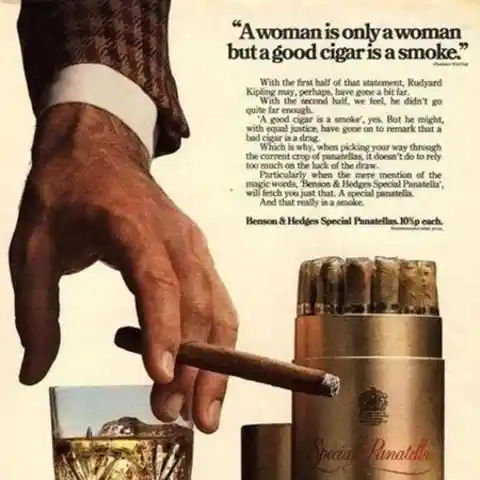
A hundred years ago, ads like these were extremely common. Ads – particularly those marketing laundry and kitchen appliances – typically depicted men as superior to women without raising any eyebrows.
Nowadays, we live in a more equitable world where women are treated more fairly. This ad would certainly rile most readers (especially women) and would never make it to the printer.
Male SceneJeans
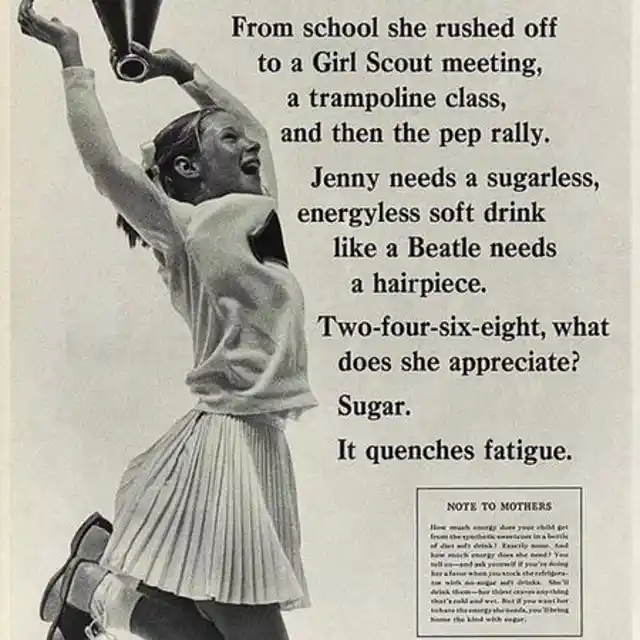
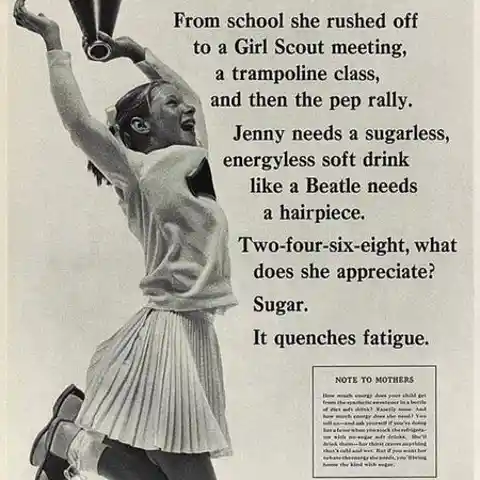
This advertisement suggests that instead of artificial sweeteners, parents should allow their children to consume sugar in order to give them the energy they need to get through their days.
Nowadays, we’re aware of the health risks associated with consuming too much sugar. Most pediatricians would probably advise parents to provide healthier alternatives than sugar to keep their children alert all day long.
The Safest Credit Card
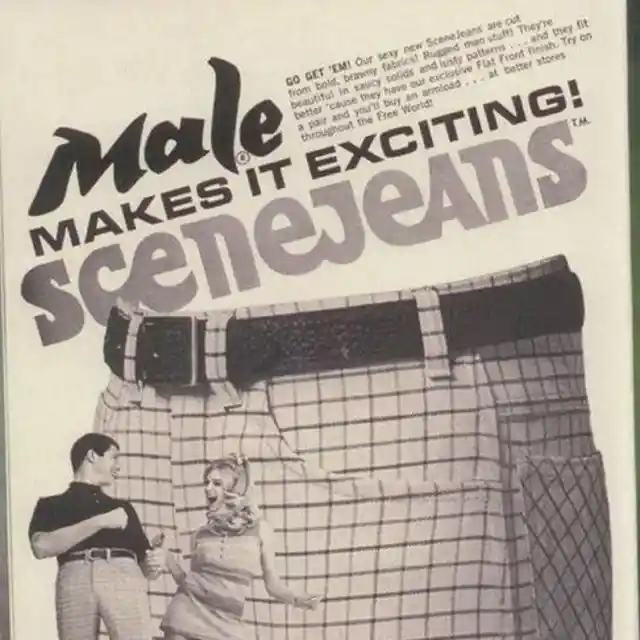
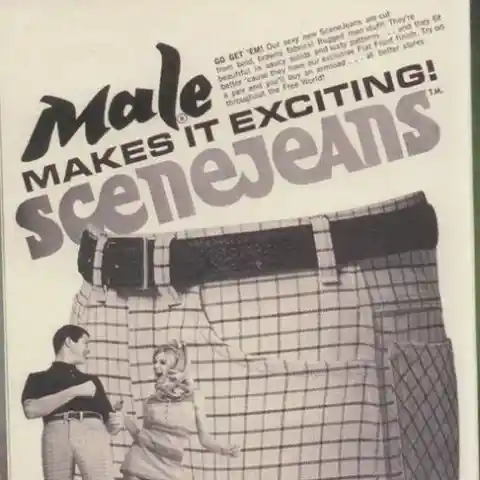
The ad’s creators used terms such as ‘delicious’ and ‘muscular’ to describe their pants. Does it make sense to call a piece of clothing lusty?
Airline Careers For Women
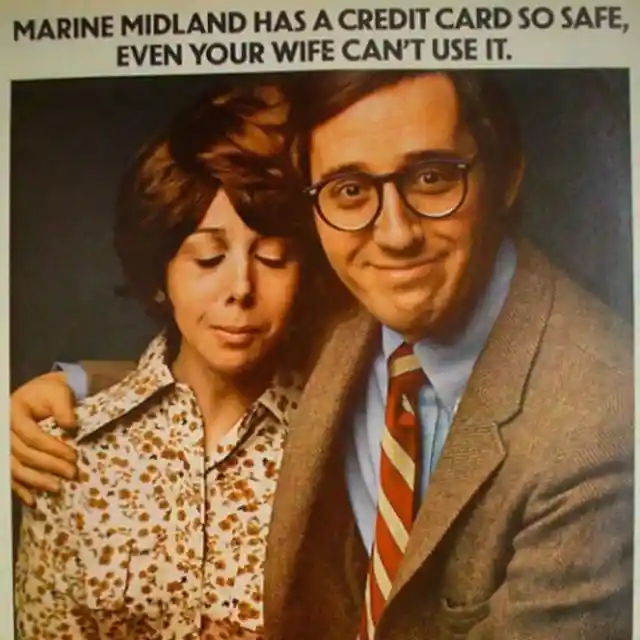
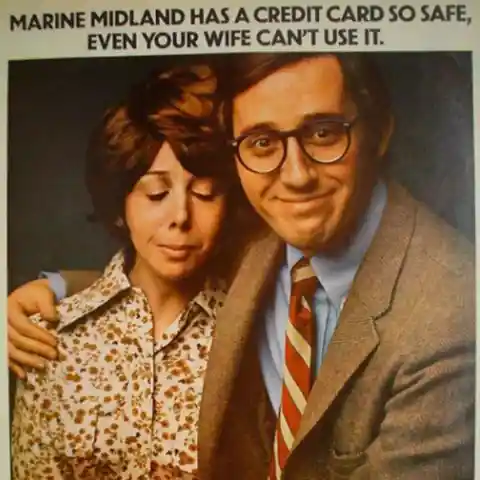
This commercial’s message says that a woman with a credit card means danger, and thus she shouldn’t have access to one. It’s implied that women don’t spend money responsibly.
The aim of the ad was to sell the safest credit card by depicting a sorrowful woman next to her joyous husband. It’s pretty clear why this ad wouldn’t be very successful today.
You Mean A Woman Can Open It?
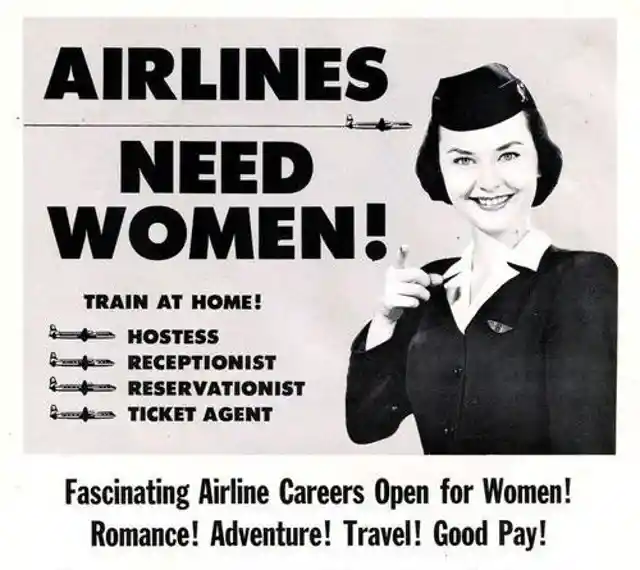
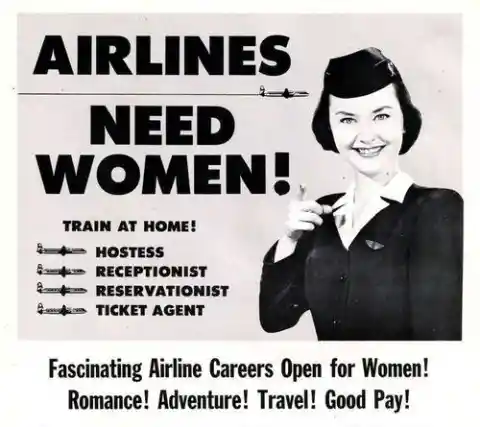
This ad would have been perfect for the ’60s if its purpose was to invite women to leave their homes, and study a career of their choice. But alas, it is not such an ad. This ad is a perfect example of how women were marketed to in the 1960s.
Even though this ad tries to seem very positive, the Airlines only hired people who physically met their standards. In those days, women could only work as hostesses and servers because that was their “place” in the company. However, that’s not the case these days.
Lucky Tiger
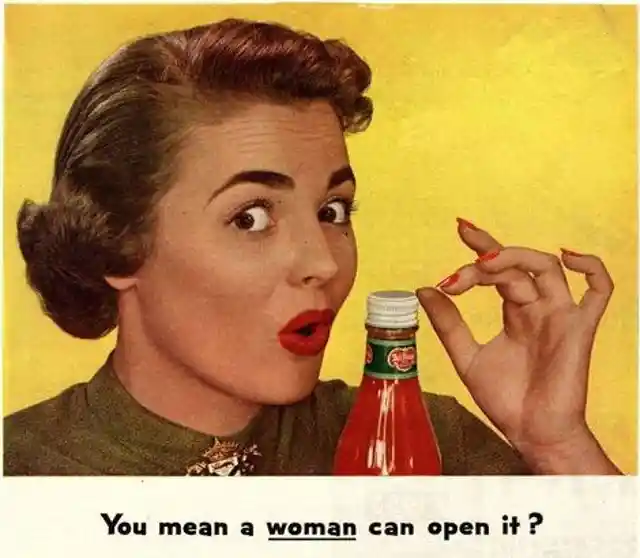
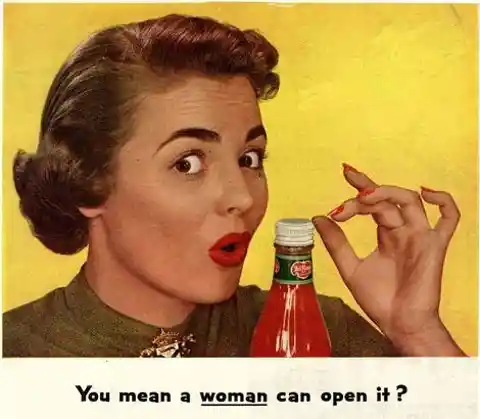
At one point in time, ads like these were very common. Nowadays, an ad like this would be banned and heavily critiqued. Nowadays, consumers are less likely to buy a product if they feel like the ad belittles women.
Strength has nothing to do with gender, and this company would receive a lot of pushback if they tried to publish this ad today. It might have been tactless in the past to produce an ad like this but nowadays it is completely inappropriate.
Flintstones And Winston Cigarettes
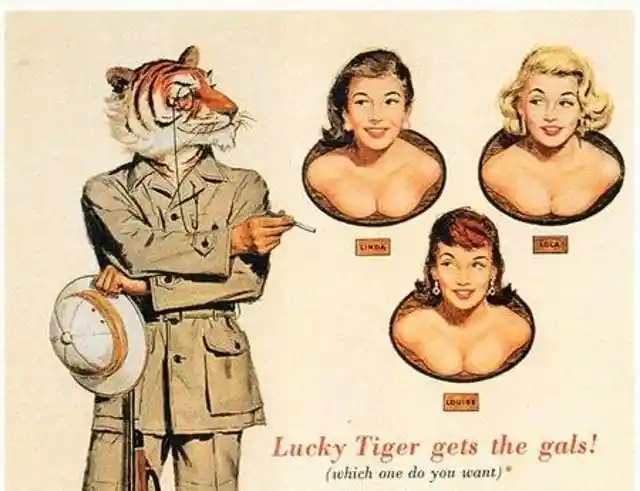
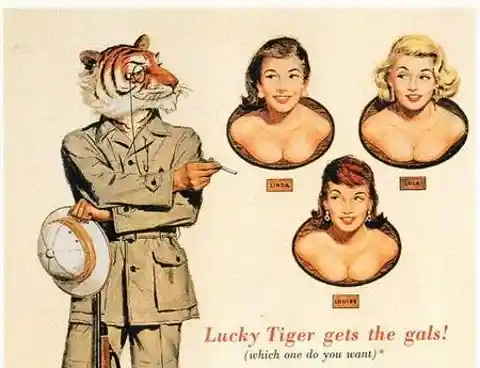
If you take a close look at this old advertisement, you’ll notice that nothing makes sense. An animal, most likely one of the hairiest ones, is the face of a hair wax campaign.
As we see an array of women’s faces hanging on the wall, this ad becomes increasingly discomforting. It reads “Which one do you want?” Thanks to public outcry, this advertisement is now gone forever.
PolyGlow Hair Coloring
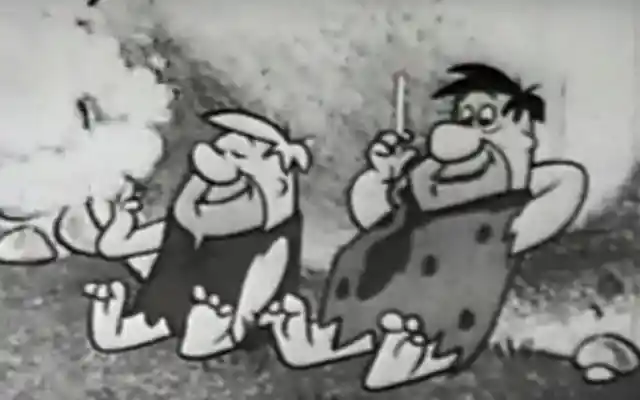
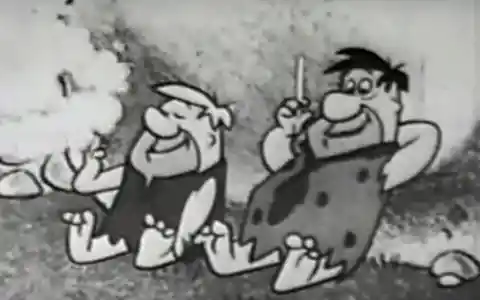
Smoking has been a prominent social behavior throughout history, despite the fact that science has repeatedly shown cigarettes to be harmful to one’s health. Even the Flintstones smoked, which is incredible, considering where they lived.
In this ad, Barney and Fred smoke to unwind after a long day at work. This advertisement would not be allowed now because cartoons made for children no longer promote cigarette smoking.
Husband Pleasing Coffee
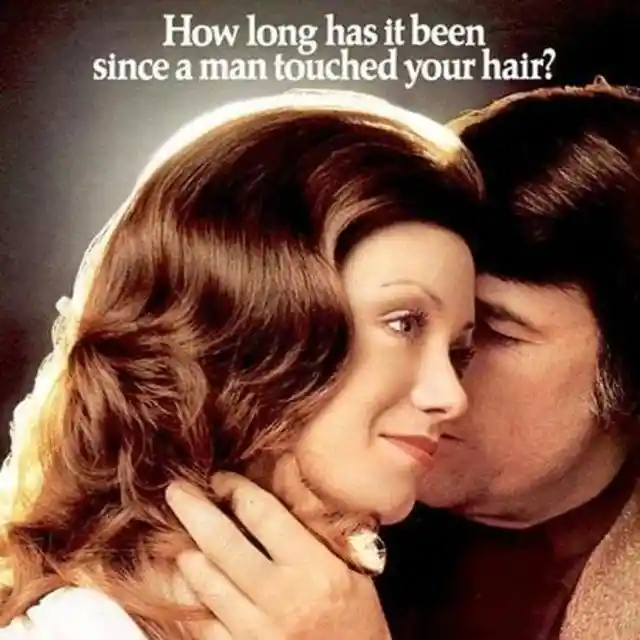
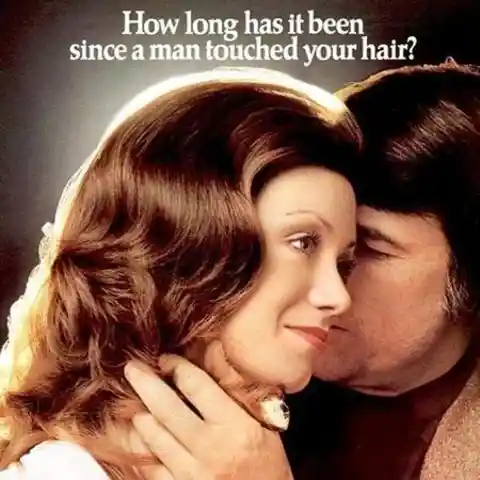
Generally, when a girl dyes her hair, it’s because she wants to change her appearance. The fun part is that she does it for herself- to feel more attractive or to try something new.
The makers of this commercial were confident that their hair coloring product would make any man fall in love with the woman who used their product. However, the way they marketed it would not go over so well these days.
The Cochon Prodigue
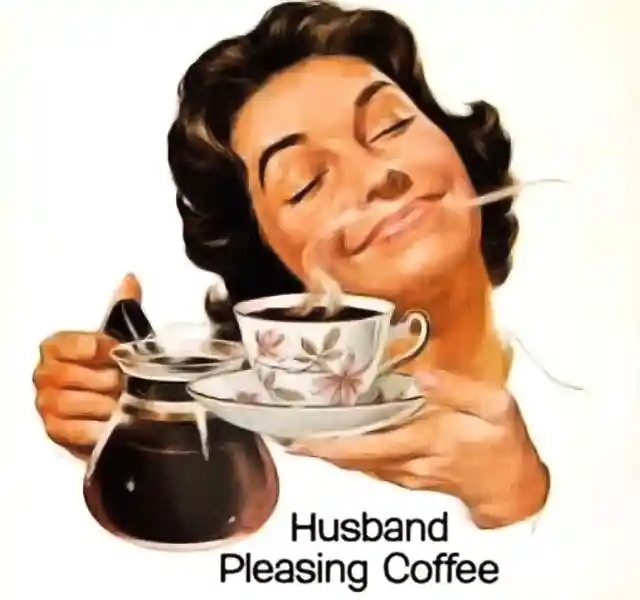
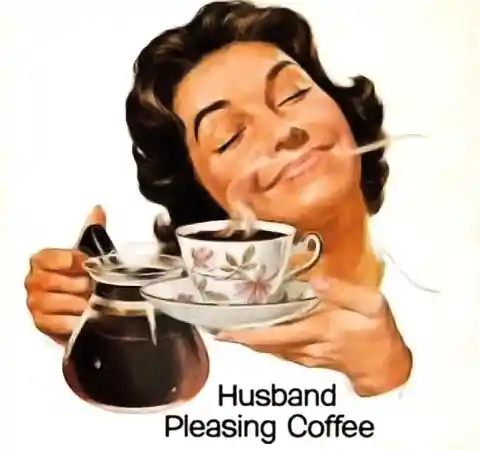
Waking up to the pleasant aroma of freshly brewed coffee is one of life’s greatest pleasures. Eggs, bacon, and a cup of fresh morning coffee were depicted in this vintage ad as the ideal breakfast for a husband.
However, the vintage ad tells women that in order to make their husbands happy, they should wait on them hand and foot. This message would not please many women nowadays.
Cocaine Toothache Drops
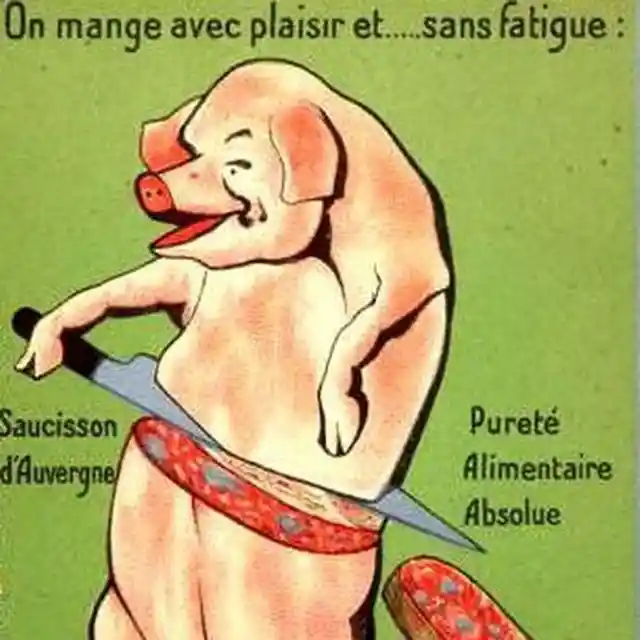
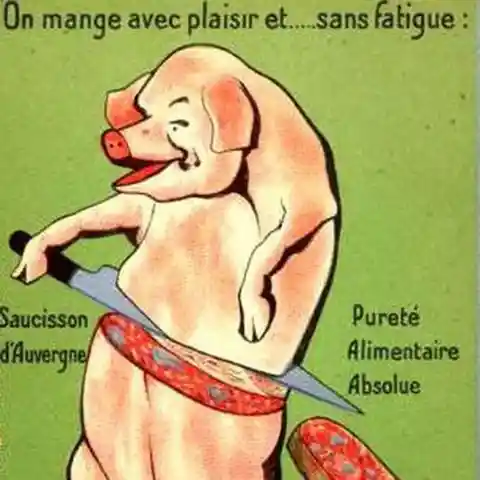
Most people love eating bacon for breakfast, but some might not know where it comes from. This ad shows the process of a pig slicing itself which could be traumatizing for some viewers.
This ad probably made some people question how their meat is processed. The graphic and disturbing images in Cochon Prodigue’s advertisement are likely to turn some viewers into vegetarians.
Beauty Cream To Fight Complexion
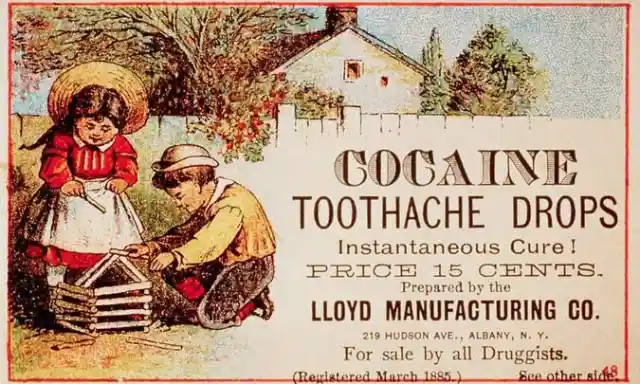
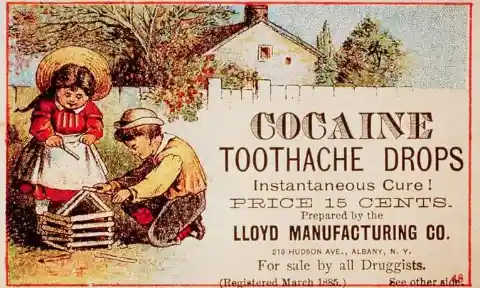
Cocaine was used in alcoholic beverages in the 1800s. Coca Wine, a combination of cocaine and wine, was the most popular drink of the period and it later became known as Coca-Cola.
In the 1980s, researchers discovered that cocaine could be used to treat pain. In the past, they didn’t have access to pain medications like we do today. The Cocaine Toothache Drops were just what they needed.
Marilyn Monroe’s Firework Safety
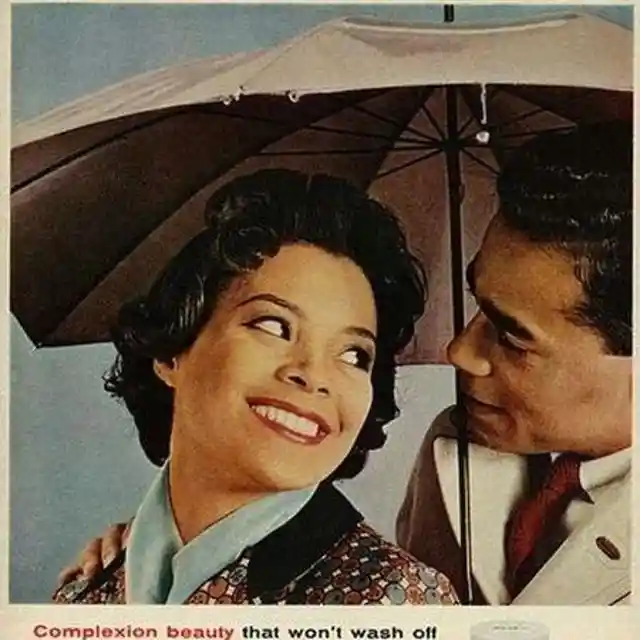
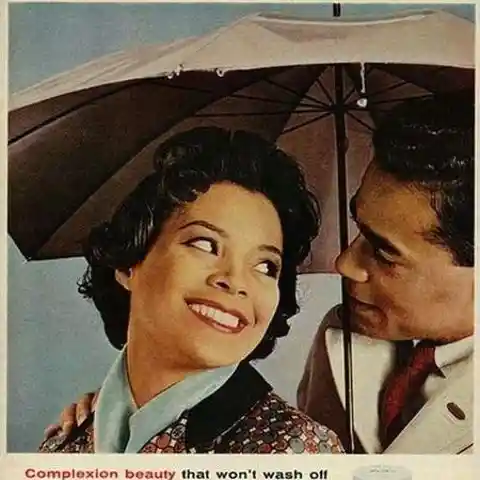
When this commercial was first aired, it drew a large audience. More than 50 years later, we see so many errors and flaws that it’s surprising. In the past, people desired whiter skin because it implied a more attractive and fascinating appearance. Nowadays, some people want darker and sun-kissed skin.
The intent of the ad was to get black people to buy a cream that would whiten their skin. Years ago, being white was seen as attractive. Now, fortunately, this perspective has shifted and advertisements now encourage people to love themselves for who they are.
Hormel Chili
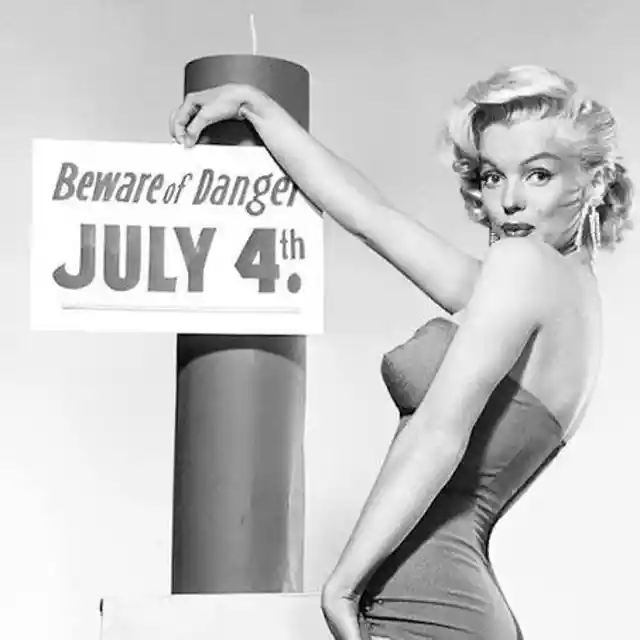
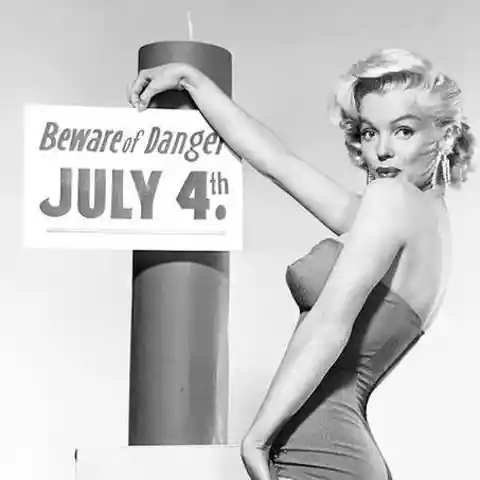
Hollywood’s favorite blonde, Marilyn Monroe, advises to “Beware of Danger” while celebrating the Fourth of July. In the 1950s, this ad may have been seen as humorous.
It is unclear what Marilyn Monroe in a tiny bathing suit has to do with firework safety, but the advertisement may have caught enough people’s attention to send the message.
Sears
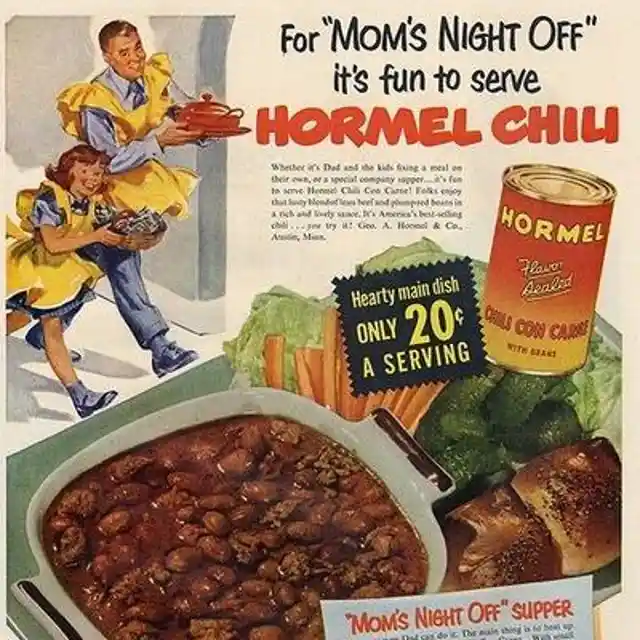
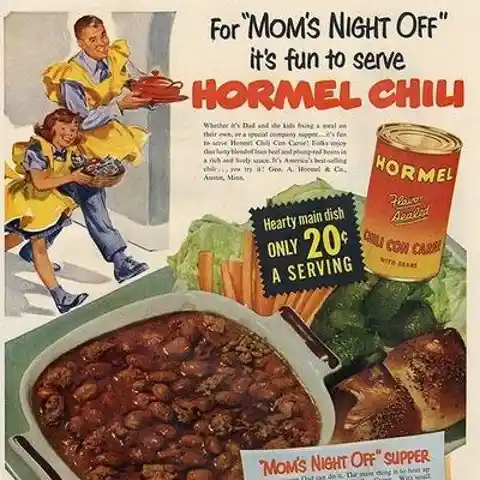
In another indication of the tough economy, Hormel marketed chili in cans as a high-protein food that would help you get more protein in your diet. The company’s “Chili for Injuns” was one of several offensive ads from the era that would never be allowed today.
This company produced other offensive ads including an ad for a “Mammy’s Diner” lunchbox that showed a black woman with large lips and a kerchief on her head, and an ad for orthopedic shoes that said, “If you can waddle, you can walk.”
Mr. Leggs
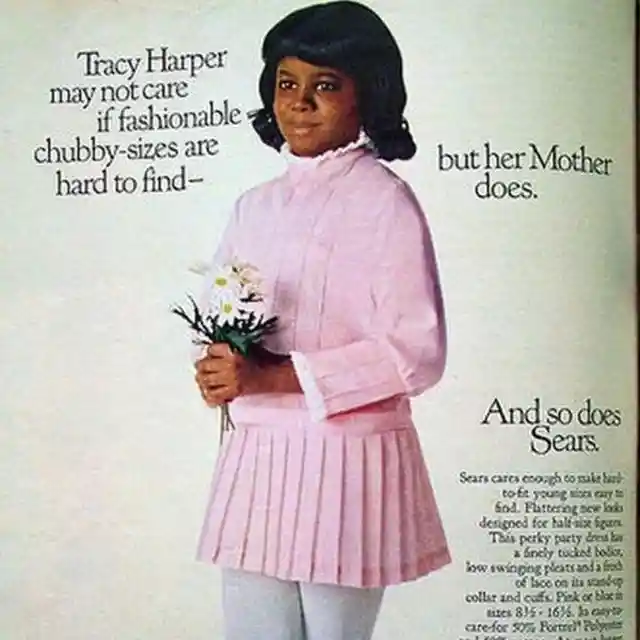
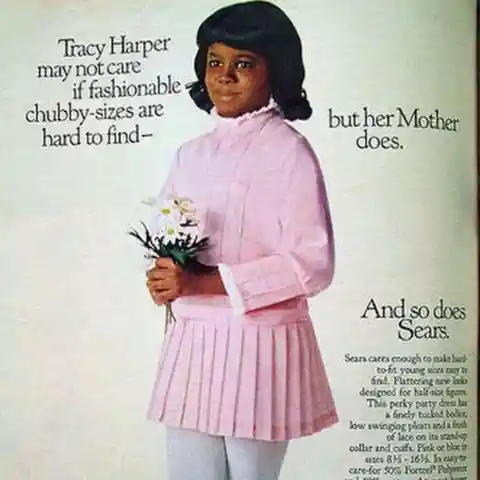
Sears produced this derogatory commercial in an attempt to make shopping easier for mothers who were looking for larger-sized clothing for their children.
In the commercial, a young girl named Tracy is described as being chubby and needing “chubby-sized” clothing. Nowadays, brands are more inclusive and ads that body shame would not see the light of day.
Groom & Clean
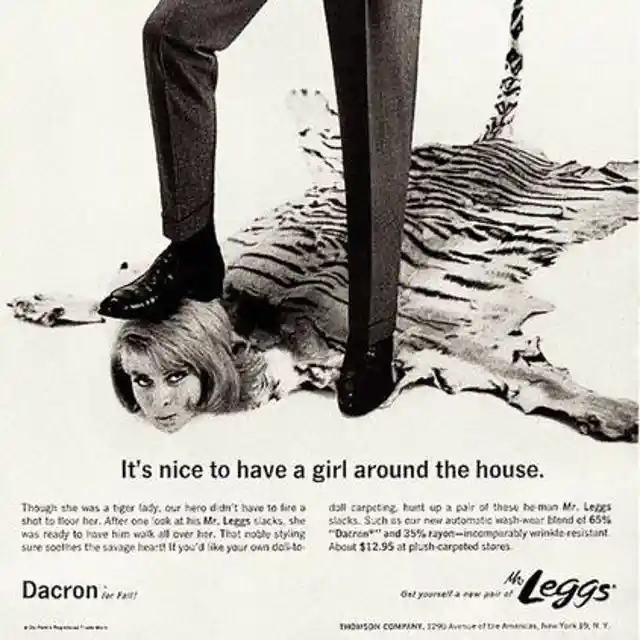
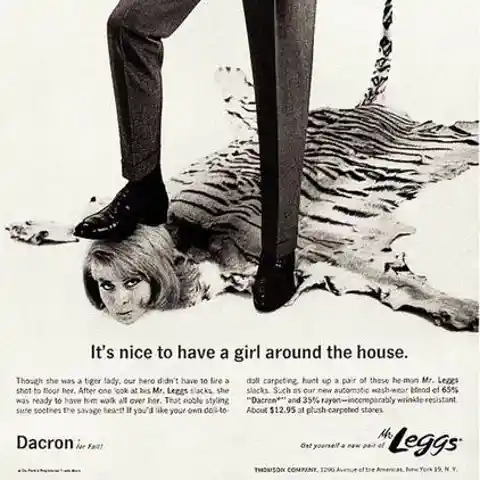
There are so many cringe-worthy things about this campaign which features a lady lying on the floor beneath a guy’s feet. Can you imagine if an ad like this were released today? It wouldn’t be well accepted by the public.
At an advertising agency in the 60s, some guy probably said “Hey, let’s put a woman in an inferior position and make it look like she’s enjoying it!” And everyone in the room probably thought it was a great idea. What were they thinking?
Carsuals’ Pants
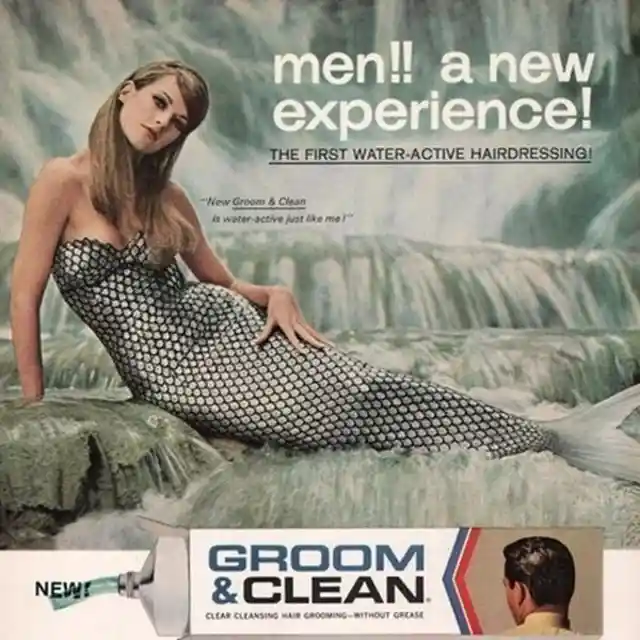
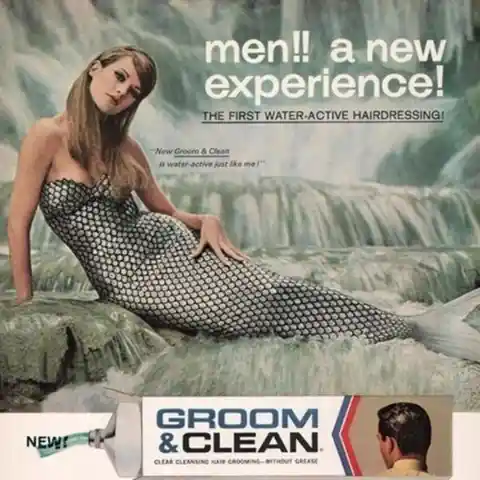
This hair product ad promoted a product that would react with water and allow men to easily brush their hair. The advertisement shows a mermaid instead of focusing on explaining the product’s benefits.
We understand that this was likely done to get men’s attention by using an attractive woman as bait. We’re still seeing this form of advertisement today, albeit in a considerably more modest format.
Volkswagen Bandwagon
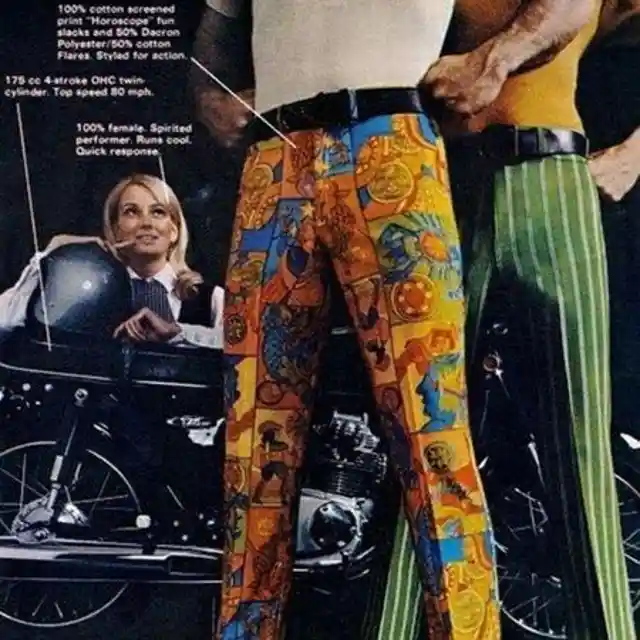
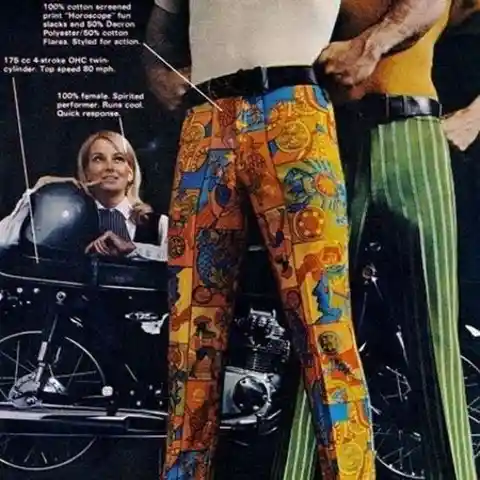
The goal of this vintage commercial was to promote “action” pants, which included horoscope drawings. They were said to be enjoyable and popular. These trousers, according to this advertisement, were the fashionable thing of the moment.
The ad suggests that women are only shallow enough to fall in love with a man if his pants look nice. However, it perpetuates the stereotype that men must always look their best to be successful with women.
Schlitz Beer
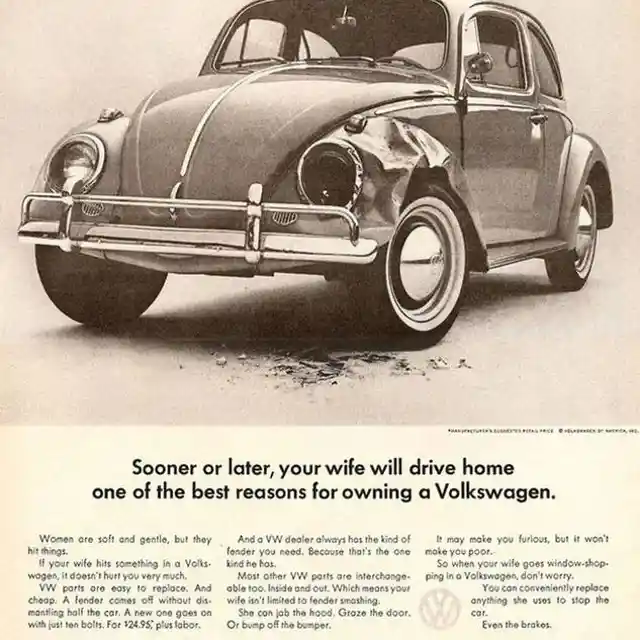
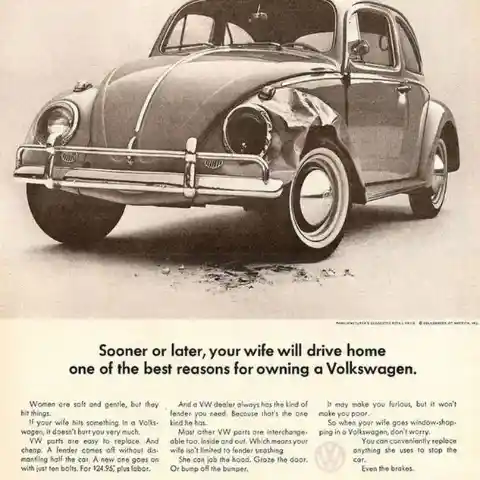
A few years ago, Volkswagen made a car that was single-handedly designed for women. Some might even say it was created with the ‘wife’ in mind—it was cheap and easy to fix whenever something went wrong.
But do we really need to thank VW for this? This advertisement claims that women are worse drivers than men, which is not at all correct. In fact, women have lower accident rates according to numerous studies.
Rest Assured Cushions
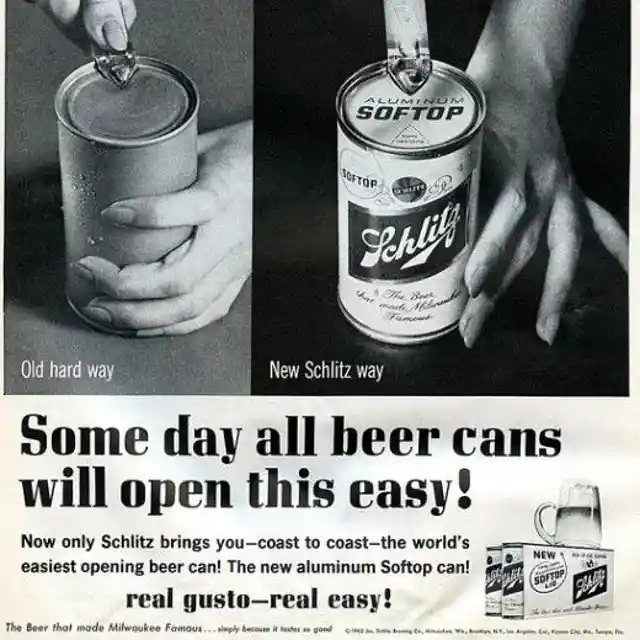
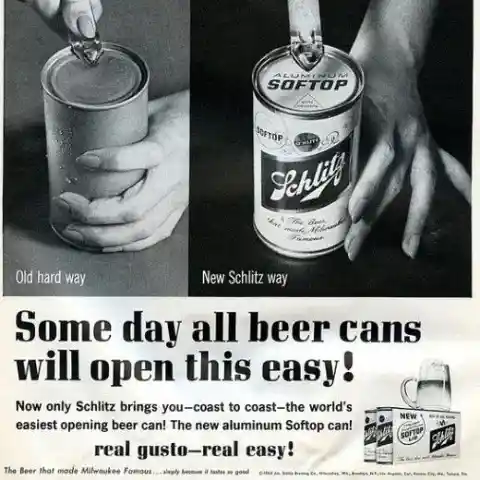
It may be hard to believe, but at one point in time, all cans did not have a pop-top tab. The only way to open them was with this type of can opener, so companies frequently tried to “innovate” this simple device. Some of their innovations were stranger than others.
This beer can opener is from the 1960s and features a design that looks like it could double as a deadly weapon. The large, sharp teeth on this opener would make it difficult to use without injuring yourself.
Plymouth


The attractive woman in the ad is shown holding a cocktail and is wearing a tight, low-cut dress that tries to reflect the “perfect curves” that this company’s couches supposedly have.
However, the couch pictured appears very rigid and is probably extremely uncomfortable, making us question why anyone would want to purchase this piece of furniture.
Volkswagen Did It Again
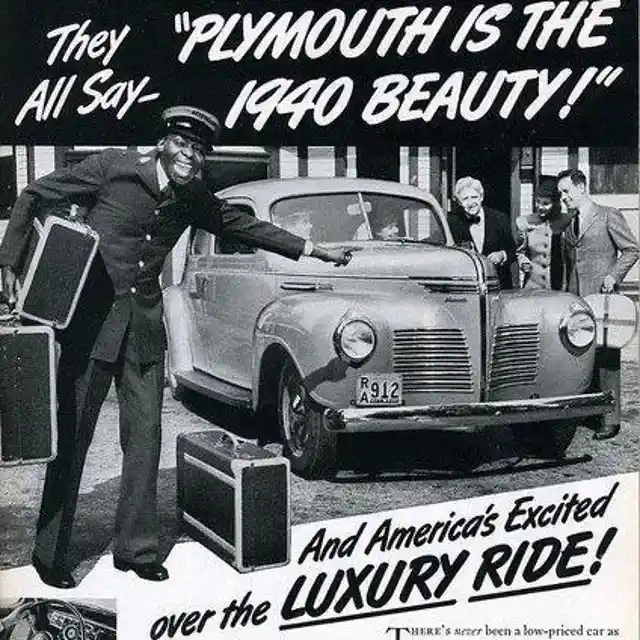
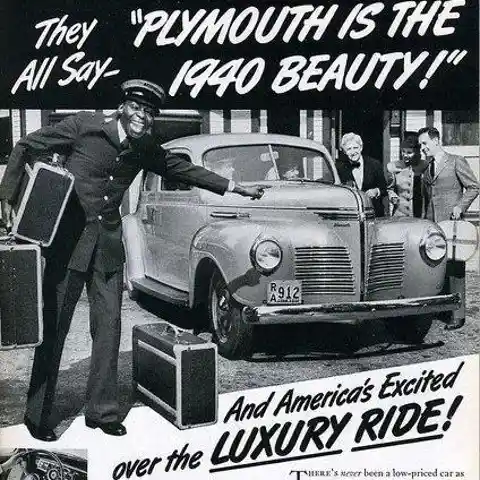
This 1940s Plymouth marketing piece is enough to make anyone cringe, and the ad text does nothing to sell us on this model.
In today’s world, such an ad would never see the light of day, but it’s a reminder of how far we’ve come in terms of diversity and inclusion. Thankfully, times have changed and we are now more aware of the need for sensitivity and inclusiveness in our marketing efforts.
Van Heusen
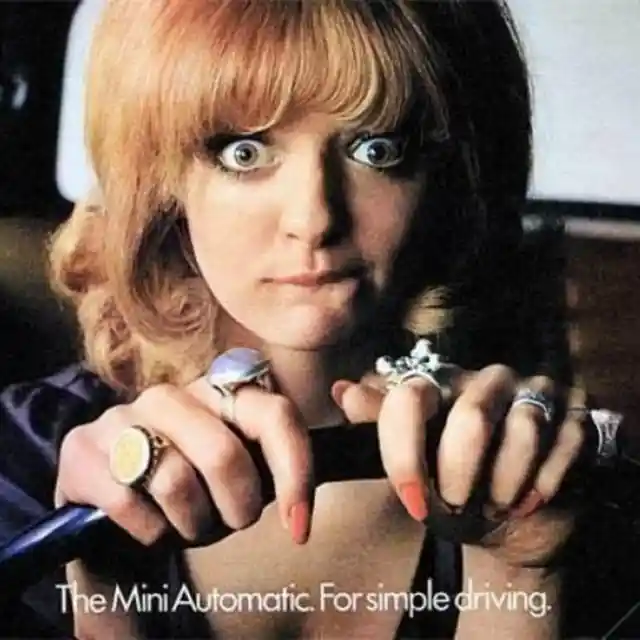
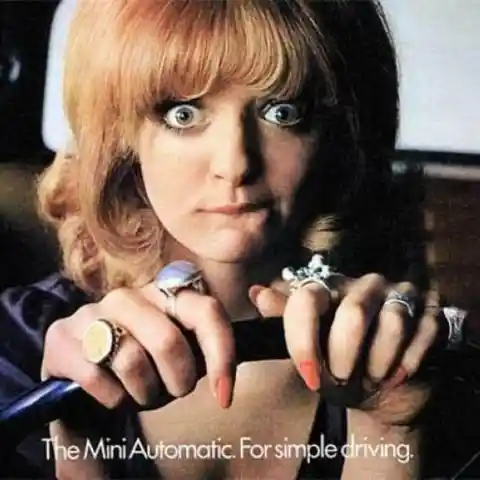
Not only did the multinational corporation produce one offensive ad, but they made another very comparable one. This new ad suggests that women are lousy drivers. The company garnered a great deal of negative publicity due to this.
The ad shows a terrified woman in the driver’s seat. She appears to be on the verge of colliding with something. The ad then goes on to claim that because women are such poor drivers, they had to create a new vehicle specifically for them.
Airflow Company
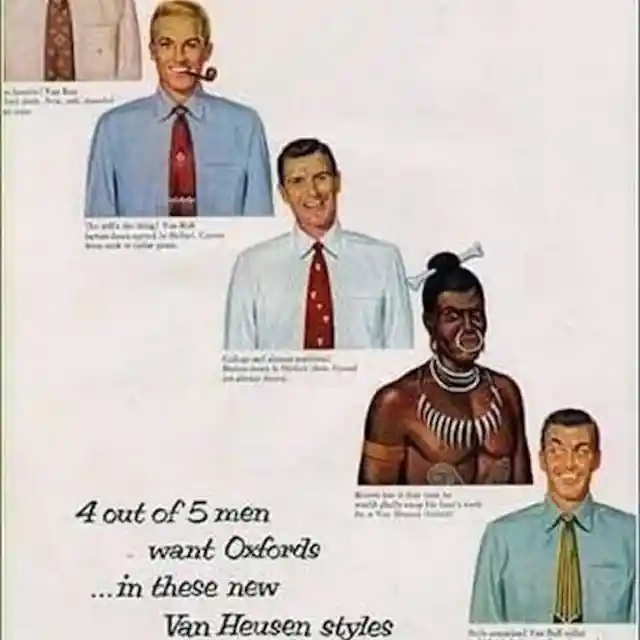
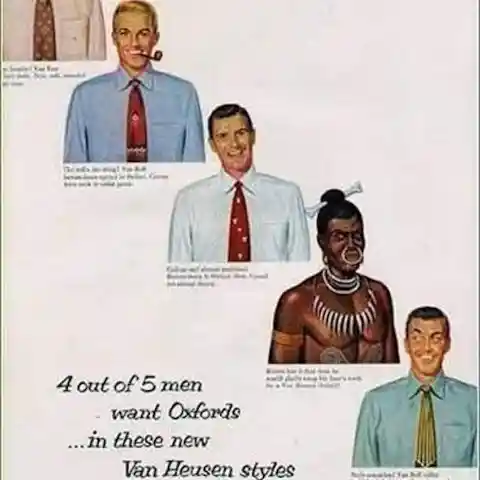
The ‘60s were a decade of change, but some advertisers stayed trapped in the past. Van Heusen is one company that continued to push offensive ads and sadly this sort of aggressive advertising was typical in those days.
The ad reads, “Four out of five men want Oxfords… in these new Van Heusen styles,” and it includes four white males and one Native American with a nose ring and a bone. During the ’60s, these sorts of messages were all too common.
McDonald’s


In the 1980s, this ad pushed for proper air ventilation for electronics. It features a woman in her bathing suit sitting at her computer and two of her colleagues in very little clothing talking behind her.
While using attention-grabbing marketing tactics is very commonplace, today’s ads tend to focus more on their product’s features and how they can benefit their consumers.
Broomsticks Pants
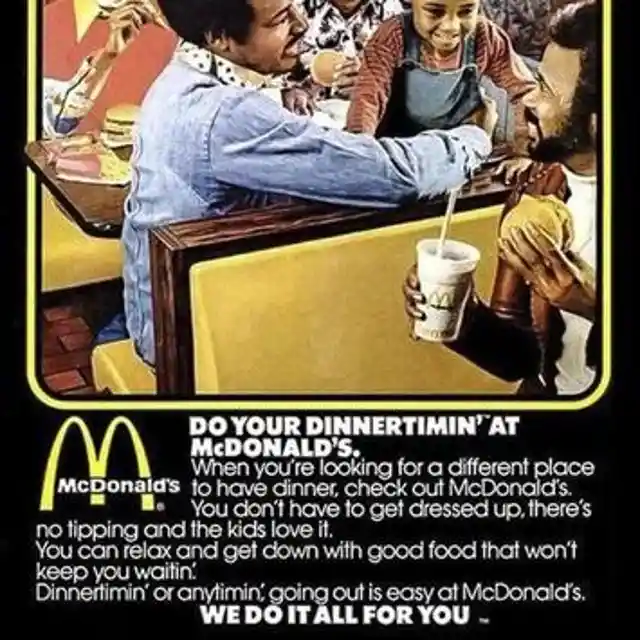
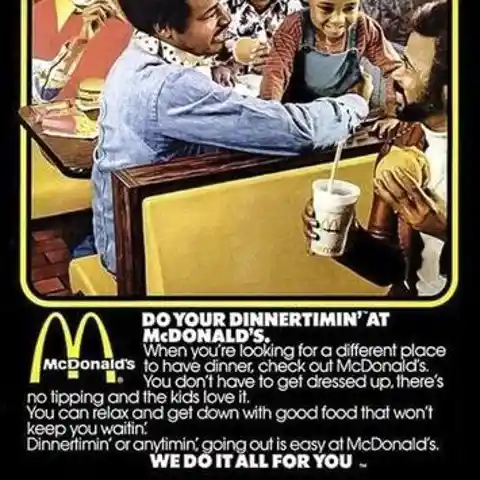
Perhaps this advertisement was considered adorable in the 1970s, but it now generates only negative feelings of discomfort for very obvious reasons.
Thankfully, ads like these are a thing of the past and would never be allowed on television or in magazines today. It’s a good thing, too—no one wants to be offended by the ads they see.
Columbia Records
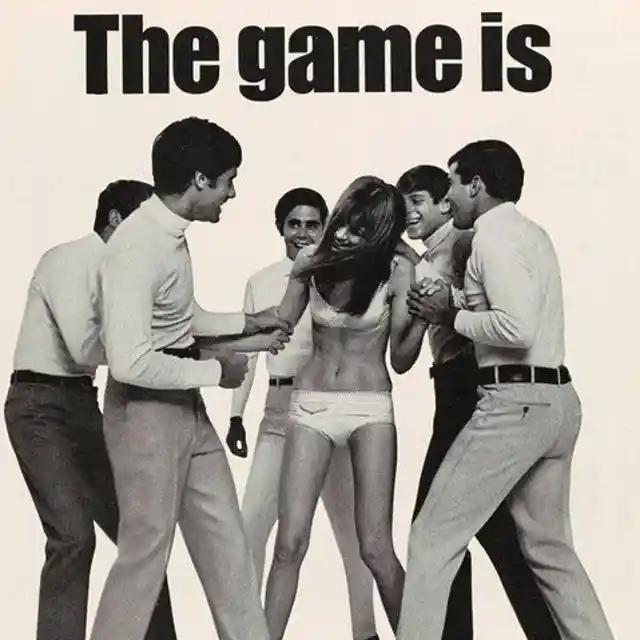
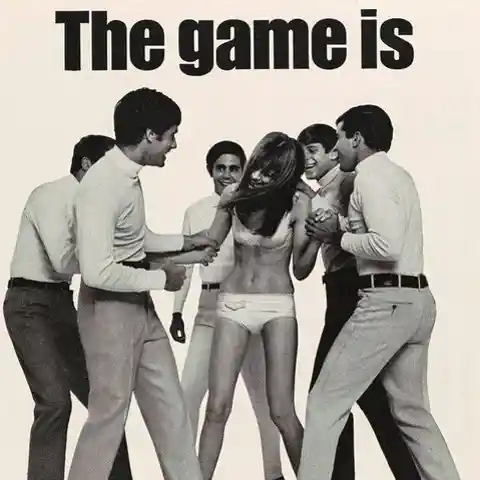
This ad for Broomsticks pants features five guys competing for the affection of one barely dressed woman. A strange way of going about it, but this ad was all about the pants.
While having nice pants does make you appear more classy, it’s not that easy to win a woman’s heart. The thought process for this ad’s creation is not very clear.
The Sugar Diet
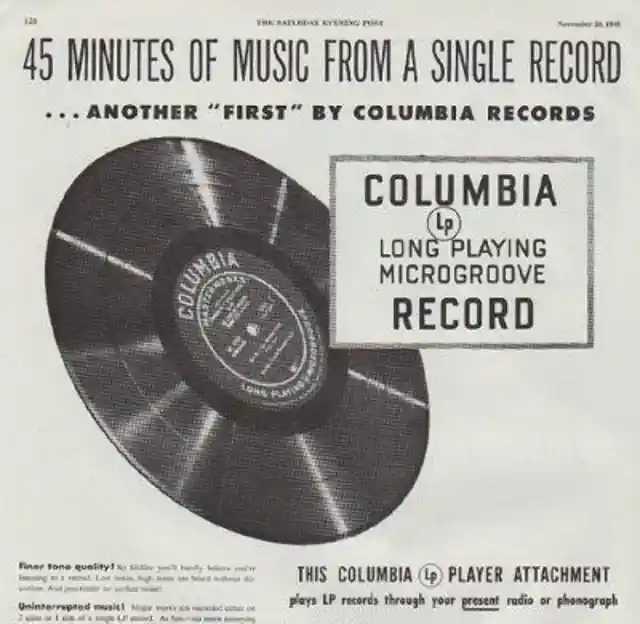
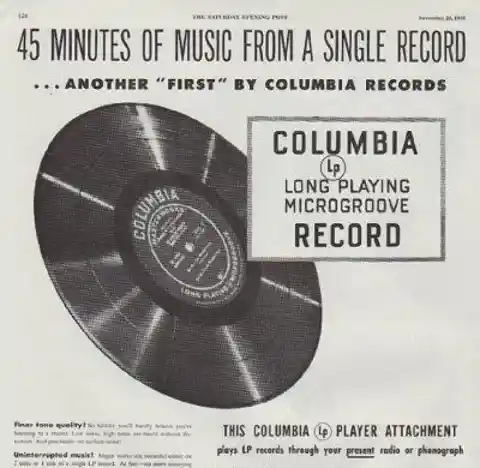
Back in the day, Columbia Records came up with the “better in bulk” idea that streaming services like Netflix later perfected. For years, people loved them for it.
Columbia Records also ran ads featuring young women in bikinis. The ads were placed in teen magazines and promised “free records” if you sent in a coupon.
Fat Chinese
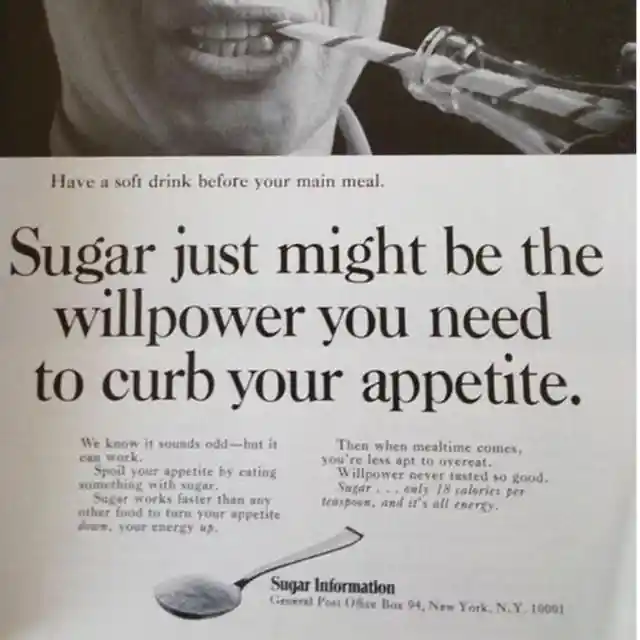
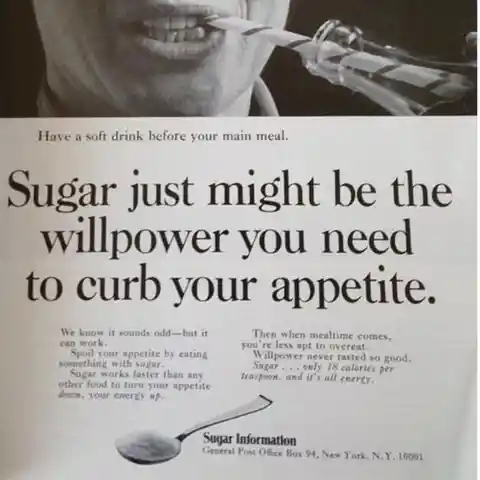
The cravings are real when you’re on a diet. It seems like everywhere you turn there’s another temptation, especially when it comes to high-calorie and greasy foods. Sometimes it feels impossible to resist the call of something sweet.
This ad suggested that sugar consumption isn’t so terrible after all. According to this ad, because sugar might cause you to lose your appetite, you can even lose weight by ingesting it. However, nowadays we’re more conscious of the perils of consuming excessive amounts of sugar.
Frito Bandito
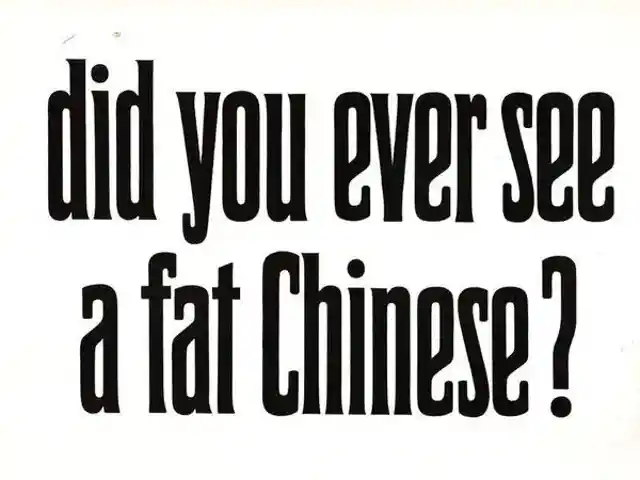
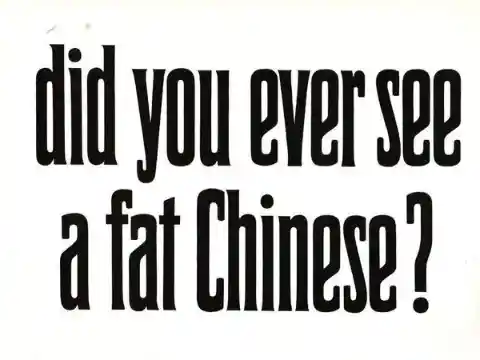
The Rice Council of America ran TV commercials in the 1960s to promote awareness and encouraged substituting potatoes for rice. They based their campaign on the fact that the Chinese are not obese (and they eat rice every day.)
While it’s true that rice is healthier than potatoes since it has a lot of fiber, stating that the Chinese people are “not fat” is very tactless and stereotypical.
The Hotpoint Happy Wife
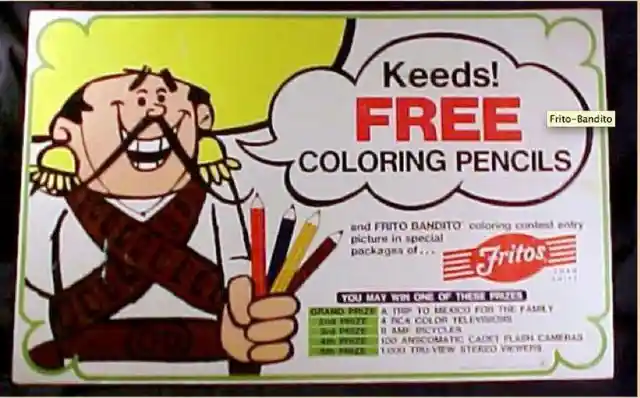
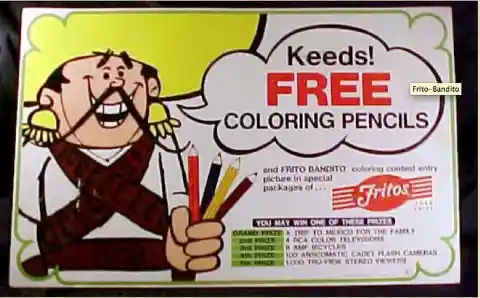
Frito Bandito, a cartoon character created by Fritos, was stereotypical of Mexican criminal characters who lived in the southern USA. This is evident from the way he pronounced kids as “keeds,” the mustache, and the big hat. The Frito Bandito caused controversy due to his depiction of Mexicans.
All Frito products had the same mascot: a bandit with a sombrero who brandished a bag of chips. The figure was dressed in military attire, and it was assumed that Frito served in the army. Overall, this ad’s message was demeaning to Mexicans.
Kohler Bathroom Fixtures
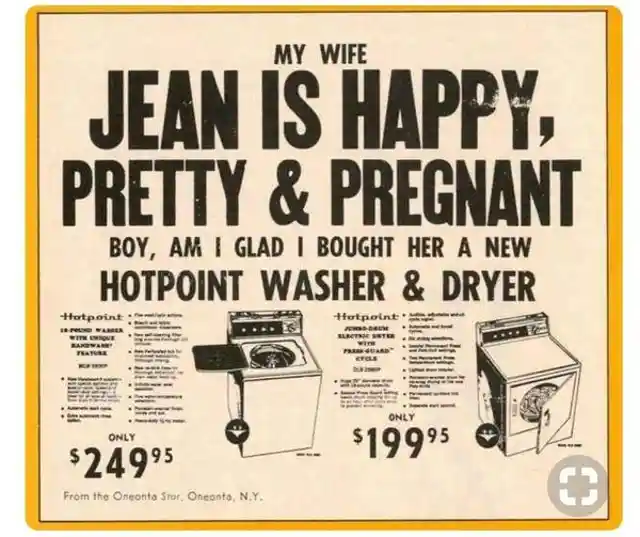
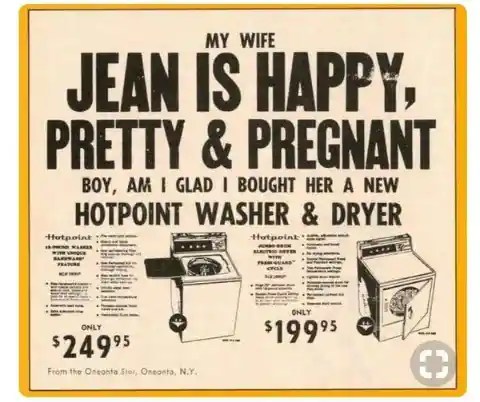
Jean’s husband has a Hotpoint washer and dryer and she gets to use it because she is his wife. Because she will not be hand-washing clothes while pregnant, the machine will perform all of the work, allowing her to relax and “be beautiful.”
There are quite a few issues with this ad. From expecting women to do the domestic chores around the house to objectifying a woman, this ad would not be accepted today.
Kellogg’s
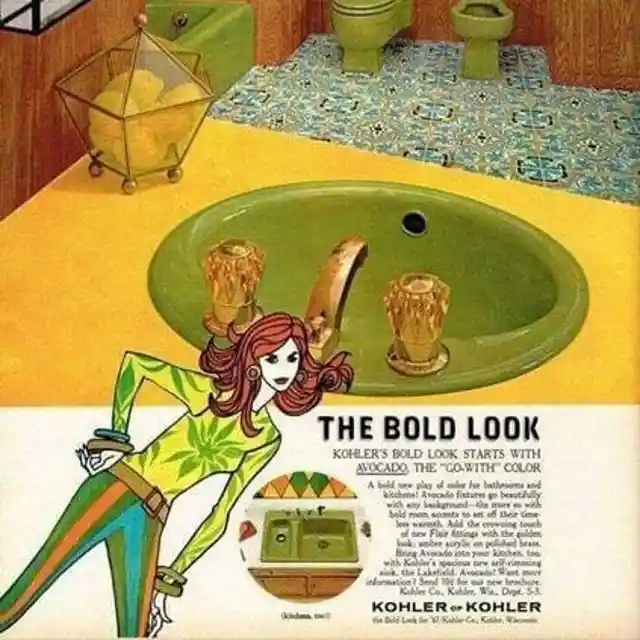
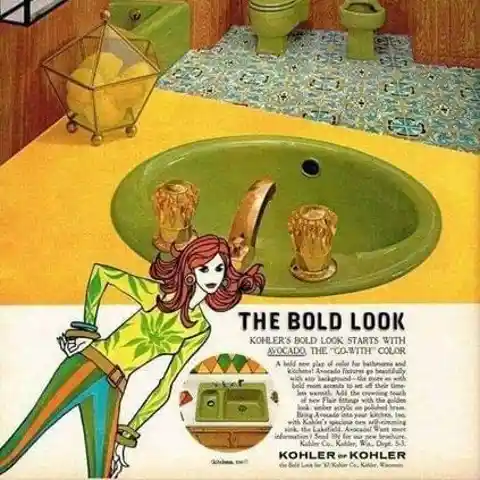
Who would have thought that in the 1960s, the IT color of choice would be puke-green? It’s hard to believe that people actually touted it as “avocado chic.”
If one fixture wasn’t bad enough, having a whole bathroom dripping with this color would be quite the sight. It seems like we’ve moved on from garish colors in our homes, thankfully.
Spark Plugs
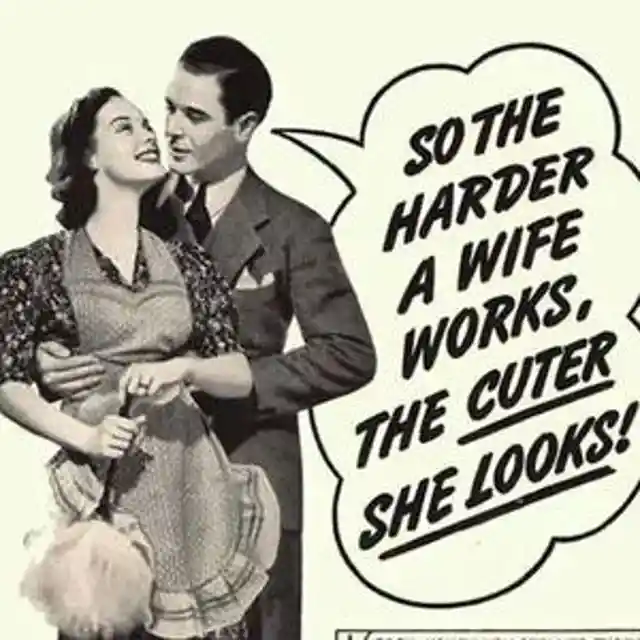
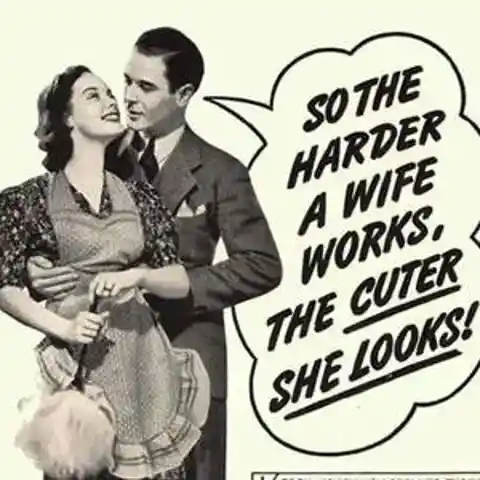
Kellogg’s marketed an energy-infused variety of cereal that was aimed at males in order to get their wives to do even more housework than they were already doing.
However, this is not the only old cereal ad that’s problematic. In 1941, Wheaties ran an ad that said “The Breakfast of Champions” was “not for women.” And in the 1950s, advertisers for Cheerios tried to appeal to women by saying the cereal would help their husbands lose weight.
O.J.’s Juice
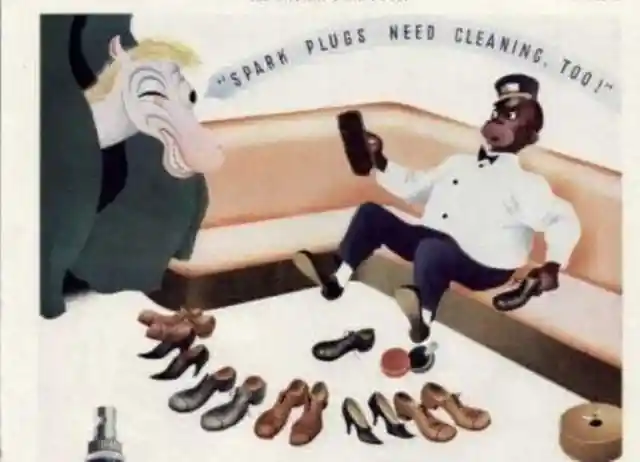
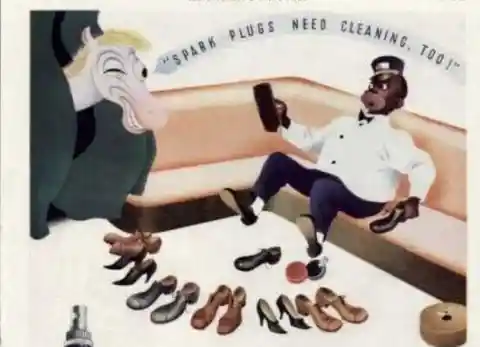
The 1940s were a difficult time for many people of color because they constantly faced discrimination and ridicule. This company, based in Indiana, was founded in 1821 but hadn’t progressed much by the early 1900s.
In the ad, you see a man of color cleaning some shoes. Out of nowhere, a white horse appears and tells the man he should be cleaning spark plugs instead. These days, society wouldn’t respond too well to this ad.
General Electric
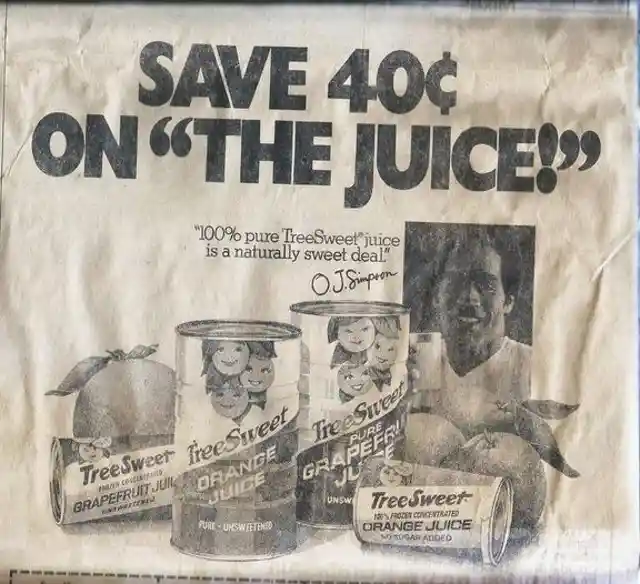
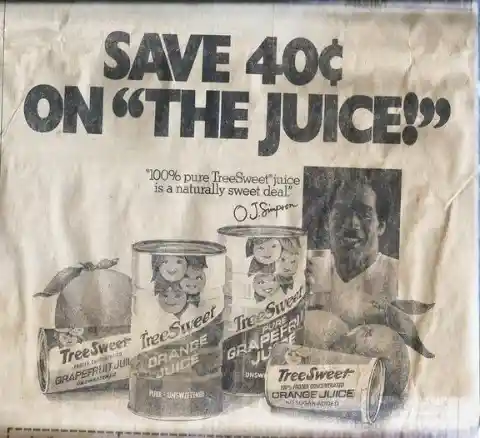
O. J. Simpson was a well-known professional football player. He made his film debut in The Naked Gun (1988). His fame became so widespread that he starred in an ad for Tree Sweet Orange Juice, which aired during the Super Bowl. The objective of the ad was to match the product with O.J.’s initials.
In an unfortunate event in 1994, Simpson’s wife, Nicole Brown Simpson, and her friend Ron Goldman were murdered. Simpson was charged with their murders but was acquitted in a criminal trial in 1995. However, he was found liable for their passings in a civil trial in 1997.
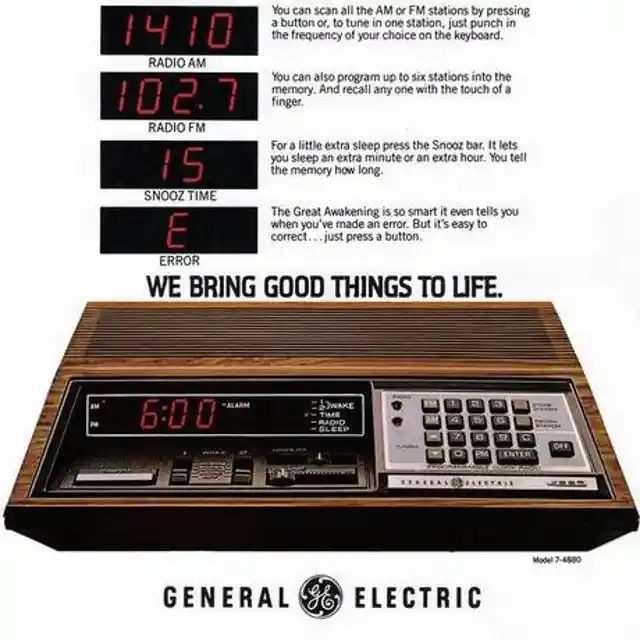
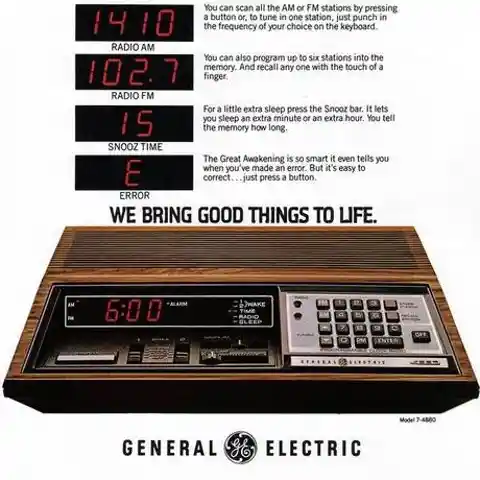
G.E.’s invention of the digital alarm clock with a SNOOZE function was well ahead of its time. Obviously, technology has progressed since then, but you can still find these alarm clocks for sale today, and if you see one at your grandma’s house, it may very well be running on its original batteries.
This ad from 1980 is for the “new” G.E. digital alarm clock, and it’s pretty amazing how well it has held up over the years. The design is clean and simple, and the function is still relevant today. It’s a great example of how a good product can stand the test of time.